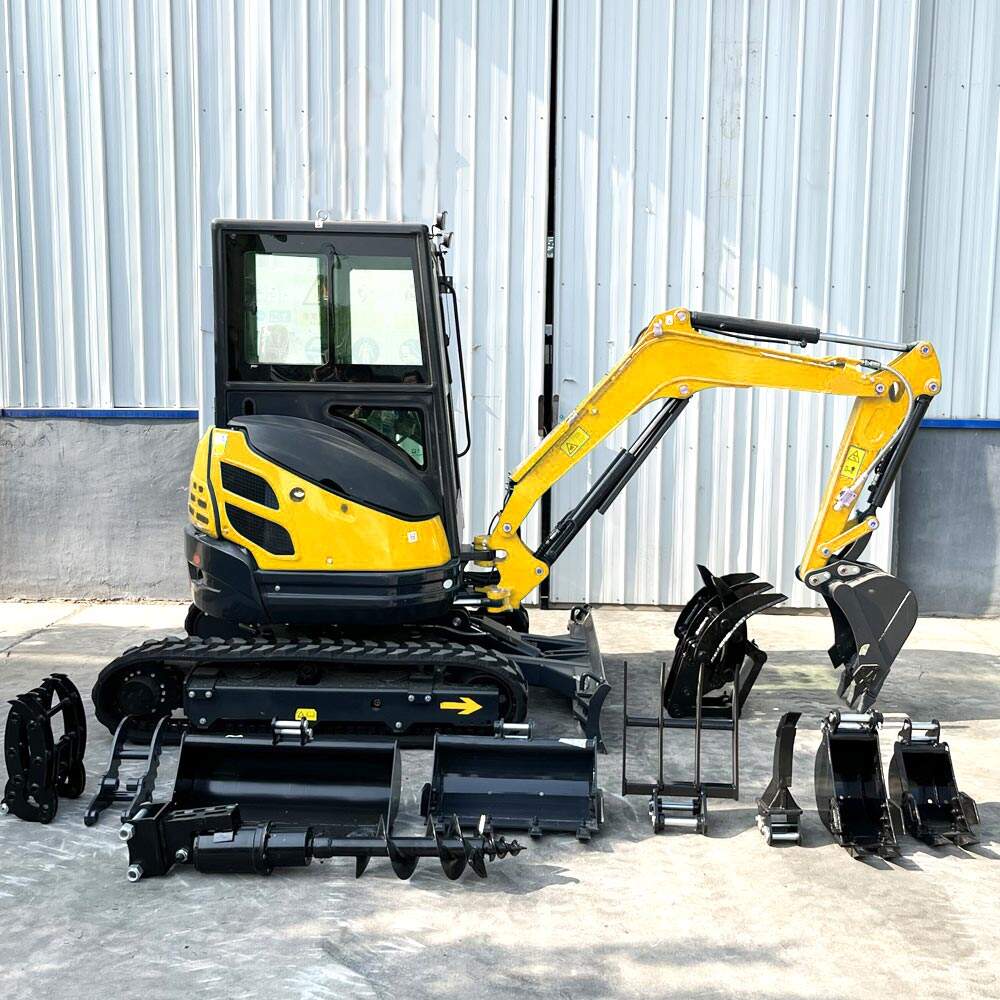Exploring the Versatility of Mini Excavators in Construction and Beyond
Understanding the Rise of Mini Excavators
Mini excavators are now pretty much essential equipment on most construction sites and landscaping jobs. These little machines pack quite a punch despite their small footprint, which makes them ideal for working in cramped areas where bigger machinery just won't fit. Contractors love them because they can dig trenches around trees, navigate between buildings, and handle all sorts of tricky terrain without losing any real digging power. We've seen sales of mini excavators climb steadily over the past few years as more businesses realize how much time and money these compact workhorses can save on site.
Advantages Over Larger Excavators
Mini excavators actually have some real advantages when compared to their full size counterparts. The compact design means they can squeeze into tight spots that regular excavators just cant reach. Plus, these little machines burn less fuel and are much simpler to move around from job site to job site, which cuts down on both money spent and headaches during transport. For contractors working on smaller jobs or those limited by space constraints, this difference matters a lot in day to day operations across construction sites nationwide.
Ideal Jobs for Mini Excavators
Residential Construction and Landscaping
Mini excavators excel in residential settings, where space constraints and delicate surroundings demand precision. Tasks such as digging foundations, trenching for utilities, grading, and landscaping are perfectly suited for these machines. Their ability to navigate around existing structures minimizes damage to property and reduces cleanup time.
Utility Installation and Repair
The installation and maintenance of underground utilities often require precise excavation in confined urban or suburban environments. Mini excavators are well-suited for digging narrow trenches for water, gas, sewer lines, and electrical conduits. Their maneuverability reduces disruption to surrounding areas and expedites project timelines.
Agricultural and Farm Use
In farming operations, mini excavators handle a range of tasks from digging irrigation channels to clearing debris. They are ideal for small-scale earthmoving, fence post installation, and pond construction. Their versatility and compact design allow farmers to perform multiple functions without needing several specialized machines.
Specialized Applications
Demolition in Tight Spaces
When demolition work takes place in areas with limited access, mini excavators provide an efficient solution. Equipped with attachments like hydraulic breakers and grapples, they can dismantle structures and clear debris safely and efficiently. Their small size allows operators to work indoors or between buildings with minimal risk.
Forestry and Environmental Work
Mini excavators are increasingly used in forestry and environmental restoration projects. Their ability to navigate uneven terrain while performing tasks such as stump removal, soil grading, and small-scale excavation makes them invaluable for sustainable land management efforts.
Snow Removal and Road Maintenance
In regions with harsh winters, mini excavators are often adapted for snow removal and minor road repairs. With appropriate attachments, they can clear snow from sidewalks and parking lots, improving safety and accessibility. Their versatility extends the machineâs usability beyond traditional excavation roles.
Factors to Consider When Choosing a Mini Excavator for Your Job
Size and Weight Constraints
Selecting the right mini excavator involves understanding the spatial limitations of your job site. Machines vary in size and weight, and choosing a model that fits within access points and transport capabilities is essential to avoid delays and added costs.
Hydraulic Power and Attachment Compatibility
Different jobs demand varying hydraulic capacities and compatible attachments. Ensure the mini excavator you choose can handle necessary tools such as augers, buckets, breakers, or grapples. This versatility enhances the machineâs value across multiple applications.
Operator Skill and Training
Efficient and safe operation depends heavily on the operatorâs proficiency. Investing in training for operators ensures that the mini excavator is used to its full potential, reducing the risk of accidents and equipment damage.

Economic Benefits of Using Mini Excavators
Lower Operating Costs
Mini excavators consume less fuel and generally have lower maintenance costs than larger machines. Their compact size also reduces transportation expenses and site preparation needs, making them cost-effective for many contractors.
Increased Productivity in Confined Areas
By enabling work in areas inaccessible to larger machines, mini excavators help avoid delays and additional labor. This efficiency translates to faster project completion and higher client satisfaction.
Flexibility and Multi-Functionality
Owning a mini excavator means access to a wide range of attachments and functionalities. This flexibility reduces the need for multiple specialized machines, saving capital expenditure and simplifying equipment management.
Industry Trends and Future Outlook
Integration of Advanced Technologies
Manufacturers are incorporating GPS guidance, telematics, and remote control features into mini excavators. These advancements improve precision, monitoring, and safety, making the machines even more valuable on modern job sites.
Growing Demand in Urban Development
As urban areas continue to densify, the need for compact and efficient machinery grows. Mini excavators are well-positioned to meet this demand, offering solutions for infrastructure upgrades, building renovations, and utility installations.
Sustainability Considerations
With increasing environmental regulations, electric and hybrid mini excavators are emerging. These models reduce emissions and noise pollution, aligning with sustainable construction practices and community expectations.
FAQ
What size mini excavator is best for residential projects?
Typically, models weighing between 1 to 3 tons are ideal for residential construction and landscaping due to their maneuverability and sufficient digging power.
Can mini excavators be used indoors?
Yes, their compact design allows operation in confined indoor spaces, especially when equipped with low-emission or electric powertrains.
How often do mini excavators require maintenance?
Regular maintenance intervals vary by manufacturer but generally include daily checks and scheduled servicing every 250 to 500 hours of operation.
Are mini excavators suitable for heavy demolition?
While capable of light demolition, mini excavators are not designed for large-scale or highly intensive demolition projects requiring larger machines.
